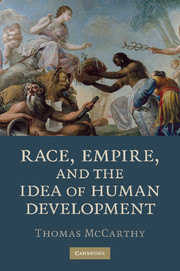Book contents
- Frontmatter
- Contents
- Acknowledgments
- Introduction
- Part One
- Part Two
- 5 What may we hope? Reflections on the idea of universal history in the wake of Kant
- 6 Liberal imperialism and the dilemma of development
- 7 From modernism to messianism: reflections on the state of “development”
- Conclusion: the presence of the past
- Index
- References
7 - From modernism to messianism: reflections on the state of “development”
Published online by Cambridge University Press: 05 June 2012
- Frontmatter
- Contents
- Acknowledgments
- Introduction
- Part One
- Part Two
- 5 What may we hope? Reflections on the idea of universal history in the wake of Kant
- 6 Liberal imperialism and the dilemma of development
- 7 From modernism to messianism: reflections on the state of “development”
- Conclusion: the presence of the past
- Index
- References
Summary
Following World War II, many of the same developmental themes that had dominated the theory and practice of imperialism in the nineteenth century reappeared. Of course, there were also important differences. For one thing, the growing differentiation and institutionalization of the social sciences in the intervening years meant that those themes were now articulated and elaborated within specialized academic disciplines. For another, the main field on which developmental theory and practice were deployed was no longer British – or, more broadly, European – imperialism but American neoimperialism. At the close of the war, the United States was not only the major military, economic, and political power left standing; it was also less implicated than European states in colonial domination abroad. The depletion of the colonial powers and the imminent breakup of their empires left it in a singular position to lead the reshaping of the postwar world. And it sought to do so in its own image and likeness, for it saw itself as the exemplar and apostle of a fully developed modernity.
In this respect it was, in some ways, reiterating the self-understanding and self-regard of the classical imperial powers of the modern period. But, in other ways America's civilizing mission was marked by the exceptionalist strain in its political history and culture, which was given an influential formulation by Louis Hartz some fifty years ago. Picking up on Alexis de Tocqueville's observation that Americans were “born equal,” Hartz elaborated upon the uniqueness of their political experience as follows.
- Type
- Chapter
- Information
- Race, Empire, and the Idea of Human Development , pp. 192 - 229Publisher: Cambridge University PressPrint publication year: 2009
References
- 1
- Cited by



